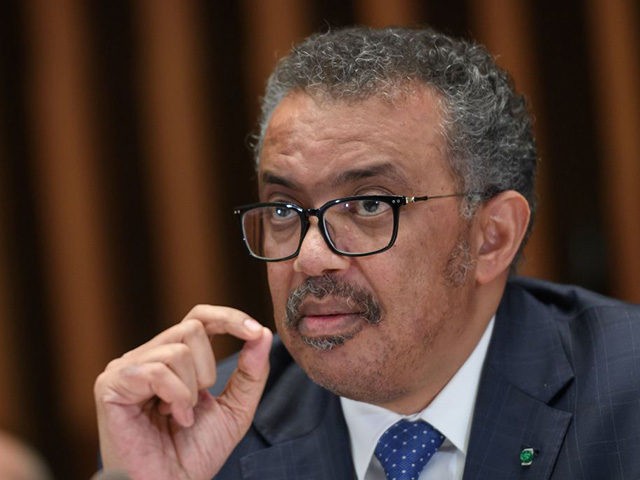The director-general of the World Health Organization (W.H.O.), Tedros Adhanom Ghebreyesus, warned countries distributing booster shots of Chinese coronavirus vaccines on Wednesday that doing so would be “likely to prolong the pandemic” because too much of the rest of the world is unvaccinated.
Tedros’ message, delivered at a media briefing this week, is consistent with the W.H.O.’s strident opposition to what it calls “blanket” booster shot implementation programs for the past year, on the grounds that the world should prioritize issuing at least one dose of an approved coronavirus vaccine to as many people as possible before offering third or fourth doses for already vaccinated people. W.H.O. officials have warned that offering booster shots while leaving much of the world unvaccinated gives the virus the opportunity to spread rapidly and, thus, evolve into unpredictable variants.
Most coronavirus cases currently diagnosed in the United States are of the omicron variant of the Chinese coronavirus, which the W.H.O. warned in late November exhibited significant deviations from the previously dominant delta variant of the virus. South African scientists first alerted the W.H.O. to the existence of omicron, but European nations later admitted they had evidence the virus was spreading there before the South African announcement, suggesting the virus did not originate in Africa.
“Our projections show that supply should be sufficient to vaccinate the entire global adult population, and to give boosters to high-risk populations, by the first quarter of 2022,” Tedros said on Wednesday. “However, only later in 2022 will supply be sufficient for extensive use of boosters in all adults.”
Tedros urged vaccine manufacturers to “work together to support those who are furthest behind” rather than offer additional protection to already vaccinated people.
“Blanket booster programmes are likely to prolong the pandemic, rather than ending it, by diverting supply to countries that already have high levels of vaccination coverage, giving the virus more opportunity to spread and mutate,” Tedros said. “It’s important to remember that the vast majority of hospitalizations and deaths are in unvaccinated people, not un-boosted people.”
“No country can boost its way out of the pandemic. And boosters cannot be seen as a ticket to go ahead with planned celebrations, without the need for other precautions,” Tedros added.
Tedros urged the world to cancel upcoming Christmas celebrations. In contrast, Tedros has applauded the celebration of other holidays during the pandemic, such as the annual Muslim hajj pilgrimage to Mecca, Saudi Arabia.
On Thursday, the Independent Allocation of Vaccines Group (IAVG), an organization helping with vaccine distribution reinforced Tedros’ opposition to booster doses of coronavirus vaccines in a statement issued through the W.H.O. urging the world to adopt the goal of vaccinating 70 percent of the world by mid-2022.
“The Independent Allocation of Vaccines Group (IAVG) has issued a set of recommendations to make the allocation of [Chinese coronavirus] vaccines more equitable and more effective,” the statement read in part. “[R]ich nations largely sidestepped COVAX [the W.H.O. vaccine distribution agency], hoarding doses for their own populations and cutting deals directly with low- and middle-income countries.”
IAVG expressed particular outrage at countries announcing “sudden” donations of large numbers of coronavirus vaccines – many of which require special refrigeration and care – without giving targeted countries the time to plan how to properly keep and distribute the doses.
“Unexpected additional vaccine allocation rounds have been undertaken after sudden announcements of vaccine availability through donations to COVAX. Worsening the challenge, these sudden donations have often included vaccines with brief expiry windows,” IAVG noted. “These last-minute scrambles added considerable stress to already severely resource-strapped countries coping with many competing health and humanitarian crises, straining participants’ ability to plan for the receipt and use of their allocated vaccines.”
This way of doing business is not acceptable and needs to end,” IAVG asserted.
Tedros has repeatedly called for a moratorium on the distribution of booster vaccines in wealthy countries since at least August, when major pharmaceutical companies like Pfizer and Moderna began suggesting that initial doses of their vaccine products were waning in effectiveness.
“W.H.O. is calling for a moratorium on boosters until at least the end of September to enable at least 10 percent of the population of every country to be vaccinated,” Tedros announced in August.
Most relevant countries, including the United States, ignored Tedros.
“The virus will get the chance to circulate in countries with low vaccination coverage, and the delta variant could evolve to become more virulent, and at the same time more potent variants could also emerge,” Tedros again urged later in that month. While his prediction of more variants emerging came through, and studies appear to indicate that omicron is far more contagious than delta, the latest dominant variant appears to result in much smaller numbers of hospitalizations and severe illness.
President Joe Biden announced a massive, nationwide booster dose promotion campaign in early December. By the end of the month, the White House warned those insufficiently vaccinated that they would experience “a winter of severe illness and death” – contradicting current scientific consensus on omicron – if they did not abide by American government recommendations on vaccinations.
“If you’re vaccinated, and you have your booster shot, you’re protected from severe illness and death. Period,” Biden asserted.

COMMENTS
Please let us know if you're having issues with commenting.